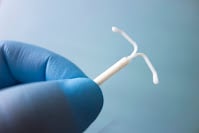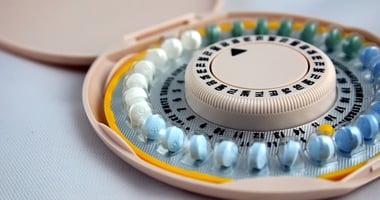Studies suggest women are at an increased risk of depression during perimenopause—the time right...
Intrauterine Hormonal Contraceptives May Raise Depression Risk, Study Finds

Women who use hormonal intrauterine contraceptives may be at increased risk for depression, according to a report in AJP. Although the absolute risk is low, the risk increases with higher hormone doses.
Levonorgestrel-releasing intrauterine systems (LNG-IUS) release the female hormone levonorgestrel in the uterus where it works to prevent pregnancy. Søren Vinther Larsen, Ph.D., of Copenhagen University Hospital and colleagues note that the systems are available in over 120 countries worldwide, and they are used by about 14% of women of reproductive age in Denmark, where the study was conducted.
The study “highlights the importance of educating women to be aware of potential mental health side effects and of clinical evaluation of mood symptoms at follow-up visits after LNG-IUS insertion,” they wrote.
Larsen and colleagues analyzed data from the Danish national birth registry on 149,200 women, ages 15-44, who were first time users of LNG-IUS between 2000 and 2022. They looked at the relative risk of depression associated with three different initial hormone-release dosages:
- low-dose 14 μg/day (22,029 users)
- medium-dose 17.5 μg/day (47,712 users)
- high-dose 21 μg/day (79,459 users)
Depression was determined by prescription of an antidepressant medication or diagnosis of depression at an inpatient or outpatient psychiatric department within one year of initiating the hormone-releasing system.
Within 12 months after initiating low-dose LNG-IUS use, 279 women had an incident of depression, compared with 633 among medium-dose users and 1,346 among high-dose users. The risk of developing depression for high dose users was 1.52 greater than the risk for low-dose users and 1.26 greater than the risk for medium dose users.
The authors emphasize that the findings do not indicate a causal link between hormonal contraception and depression. Moreover, they note that the absolute risk of depression for all three doses was low (between 1.2% and 1.8%) and that increasing dosages were associated with only a small proportion of women developing depression to a degree that resulted in medical attention.
The results “should be weighed against potential benefits as well as other side effects of LNG-IUS use when providing personalized contraceptive counseling,” the authors wrote.
For related information, see the Psychiatric News article, “Depression After Hormonal Contraception Linked to PPD.”
(Image: Getty Images/iStock/Lalocracio)
Don't miss out! To learn about newly posted articles in Psychiatric News, please sign up here.





